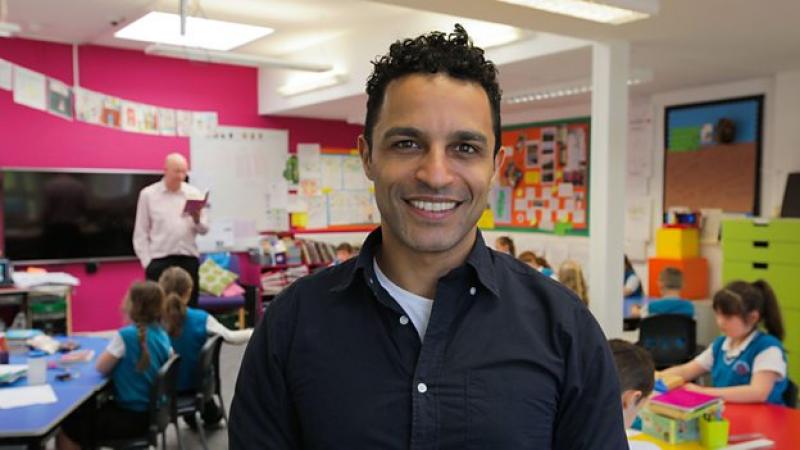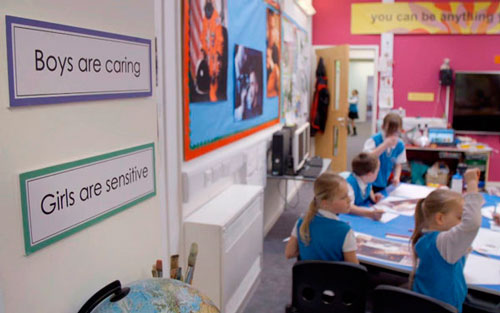No More Boys and Girls, BBC Two – baby steps lead to great leaps for children | reviews, news & interviews
No More Boys and Girls, BBC Two – baby steps lead to great leaps for children
No More Boys and Girls, BBC Two – baby steps lead to great leaps for children
A classroom becomes the first battleground for one doctor's war on gender bias

Whether it’s the £400,000 that separates Mishal Husain from John Humphrys, or the 74 million miles between the metaphorical markers of Venus and Mars, there is a gulf between the genders. Despite legislation to enforce equality, the reality is that, right from the start, boys and girls are treated differently. Boys like trains, right?
The first of Doctor Javid Abdelmoneim’s two-part BBC Two series looking at the effects of gender stereotyping on young children stated its intent right from the off: nature accounts for very little other than the glaringly obvious, and what society often sees as hard-wired points of difference between men and women can be put down to nurture. Could this lead to a kind of attitudinal architecture that builds inequality into our system from the start? Are these the embers that stoke the furnace in which the glass ceiling is forged?
Taking a class of children born in 2010 (fittingly, the year the Equality Act became law) on the Isle of Wight, Doctor Abdelmoneim aimed to show how these attitudes can be amplified by even the most well-meaning of us, and – more encouragingly – how small changes might have a big impact.
This was, at first, profoundly depressing viewing as seven-year-old girls defined themselves solely in terms of their appearance, and associated attributes such as strength with their male counterparts. However, through a series of baby steps, the children were encouraged to see one another in very different terms. Getting rid of segregated toilets, changing reading habits and decorating the walls with motivational messages (pictured below) may seem like incidentals, but it appeared to help in informing how these little sponges saw the world. In the longer term, though, could they really prove a useful barrier to the flood of colour-coded communiqués our kids are subjected to?
 While there was some progress in the children's outlook, the most dramatic change came when Doctor Abdelmoneim took the children to the playing field to, well… level the playing field. During an experiment to look at the pupils’ assessment of their own ability in a test of strength, one girl was left in tears after exceeding her meagre expectations. However, for one of the boys, an inability to perform left him in furious tears. His rage was a visceral reminder that gender bias does both genders a disservice – boys are often left less able to describe their emotions. Unless that emotion is anger, in which case they're like a thesaurus set to "wrath".
While there was some progress in the children's outlook, the most dramatic change came when Doctor Abdelmoneim took the children to the playing field to, well… level the playing field. During an experiment to look at the pupils’ assessment of their own ability in a test of strength, one girl was left in tears after exceeding her meagre expectations. However, for one of the boys, an inability to perform left him in furious tears. His rage was a visceral reminder that gender bias does both genders a disservice – boys are often left less able to describe their emotions. Unless that emotion is anger, in which case they're like a thesaurus set to "wrath".
The methods applied weren’t entirely unproblematic. Asking the pupils to assign a gender to a word, for example, contains an implication that they have to chose one over the other. It doesn’t allow for the option of both (or neither), and this may have skewed the impression of how the kids interpreted the world. Also, personal experience has shown me that a daughter's unwelcome predilection for princesses and make-up is not itself a barrier to football skills or outrunning classmates. However, these were necessarily broad strokes in order to analyse what most already suspect to be true, and work out ways to combat it. We know deep down what the fight is; this was talking tactics.
On a positive note, the balance between analysis and sentiment was well struck. While you can’t help but feel for the children, the editing stopped well short of any kind of cloying "emotional journey" narrative. There is, though, a strong suspicion that the intensity will be ramped up in the second part. The good doctor was helped in this opener by Graham Andre, a kind and well-meaning teacher who confronted his own bias with an open mind and a willingness to change - not qualities to be underrated. Next week, it’s the turn of the pupils’ parents, and that is sure to be trickier terrain.
The future of Arts Journalism
You can stop theartsdesk.com closing!
We urgently need financing to survive. Our fundraising drive has thus far raised £49,000 but we need to reach £100,000 or we will be forced to close. Please contribute here: https://gofund.me/c3f6033d
And if you can forward this information to anyone who might assist, we’d be grateful.

Subscribe to theartsdesk.com
Thank you for continuing to read our work on theartsdesk.com. For unlimited access to every article in its entirety, including our archive of more than 15,000 pieces, we're asking for £5 per month or £40 per year. We feel it's a very good deal, and hope you do too.
To take a subscription now simply click here.
And if you're looking for that extra gift for a friend or family member, why not treat them to a theartsdesk.com gift subscription?
more TV
 Slow Horses, Series 5, Apple TV+ review - terror, trauma and impeccable comic timing
Jackson Lamb's band of MI5 misfits continues to fascinate and amuse
Slow Horses, Series 5, Apple TV+ review - terror, trauma and impeccable comic timing
Jackson Lamb's band of MI5 misfits continues to fascinate and amuse
 Coldwater, ITV1 review - horror and black comedy in the Highlands
Superb cast lights up David Ireland's cunning thriller
Coldwater, ITV1 review - horror and black comedy in the Highlands
Superb cast lights up David Ireland's cunning thriller
 Blu-ray: The Sweeney - Series One
Influential and entertaining 1970s police drama, handsomely restored
Blu-ray: The Sweeney - Series One
Influential and entertaining 1970s police drama, handsomely restored
 I Fought the Law, ITVX review - how an 800-year-old law was challenged and changed
Sheridan Smith's raw performance dominates ITV's new docudrama about injustice
I Fought the Law, ITVX review - how an 800-year-old law was challenged and changed
Sheridan Smith's raw performance dominates ITV's new docudrama about injustice
 The Paper, Sky Max review - a spinoff of the US Office worth waiting 20 years for
Perfectly judged recycling of the original's key elements, with a star turn at its heart
The Paper, Sky Max review - a spinoff of the US Office worth waiting 20 years for
Perfectly judged recycling of the original's key elements, with a star turn at its heart
 The Guest, BBC One review - be careful what you wish for
A terrific Eve Myles stars in addictive Welsh mystery
The Guest, BBC One review - be careful what you wish for
A terrific Eve Myles stars in addictive Welsh mystery
 theartsdesk Q&A: Suranne Jones on 'Hostage', power pants and politics
The star and producer talks about taking on the role of Prime Minister, wearing high heels and living in the public eye
theartsdesk Q&A: Suranne Jones on 'Hostage', power pants and politics
The star and producer talks about taking on the role of Prime Minister, wearing high heels and living in the public eye
 King & Conqueror, BBC One review - not many kicks in 1066
Turgid medieval drama leaves viewers in the dark
King & Conqueror, BBC One review - not many kicks in 1066
Turgid medieval drama leaves viewers in the dark
 Hostage, Netflix review - entente not-too-cordiale
Suranne Jones and Julie Delpy cross swords in confused political drama
Hostage, Netflix review - entente not-too-cordiale
Suranne Jones and Julie Delpy cross swords in confused political drama
 In Flight, Channel 4 review - drugs, thugs and Bulgarian gangsters
Katherine Kelly's flight attendant is battling a sea of troubles
In Flight, Channel 4 review - drugs, thugs and Bulgarian gangsters
Katherine Kelly's flight attendant is battling a sea of troubles
 Alien: Earth, Disney+ review - was this interstellar journey really necessary?
Noah Hawley's lavish sci-fi series brings Ridley Scott's monster back home
Alien: Earth, Disney+ review - was this interstellar journey really necessary?
Noah Hawley's lavish sci-fi series brings Ridley Scott's monster back home
 The Count of Monte Cristo, U&Drama review - silly telly for the silly season
Umpteenth incarnation of the Alexandre Dumas novel is no better than it should be
The Count of Monte Cristo, U&Drama review - silly telly for the silly season
Umpteenth incarnation of the Alexandre Dumas novel is no better than it should be

Add comment